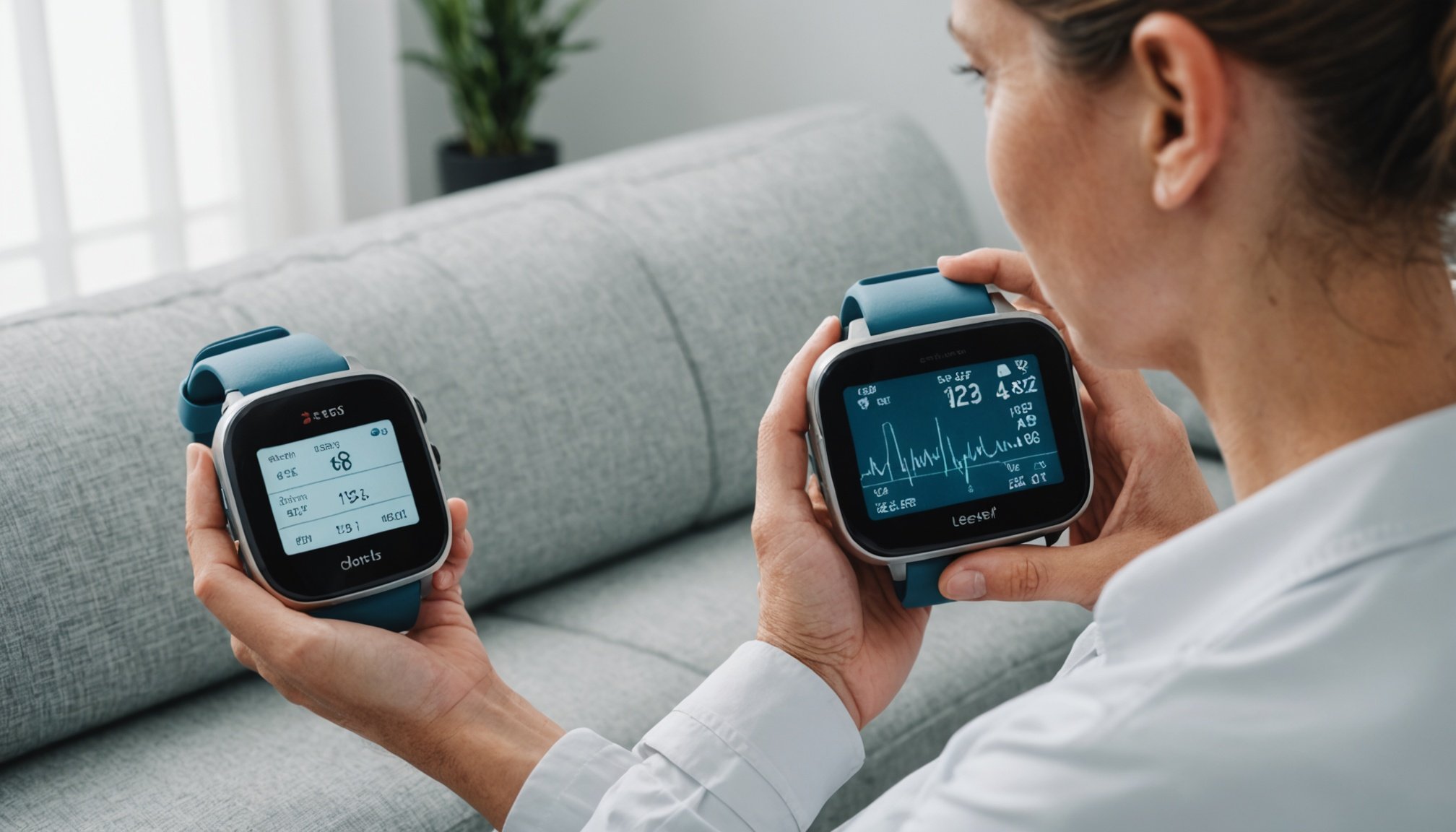Overview of At-Home Fetal Heart Rate Monitoring Technologies
At-home fetal heart rate monitoring has become crucial for expectant parents, offering reassurance and the ability to ensure fetal well-being from the comfort of their home. This technology allows for continuous monitoring, providing insights on the baby’s health and detecting any anomalies early. Monitoring fetal heart rate is pivotal in assessing fetal distress and ensuring timely medical intervention when required.
Over the years, fetal monitoring systems have seen considerable evolution. From the traditional stethoscope to innovative technologies such as Doppler monitors and mobile apps that interface with wearable devices, the journey of fetal monitoring has been noteworthy. These advancements have refined accuracy, ease of use, and accessibility for expectant parents.
Have you seen this : Smart screen time strategies for uk moms-to-be: your comprehensive guide to reducing digital exposure
Current fetal monitoring systems available for home use encompass a range of technologies. Doppler devices, which use ultrasound technology, have been popular for years. Recently, app-based solutions have emerged, leveraging smartphone technology to provide an accessible and user-friendly interface for at-home fetal heart rate monitoring. These systems offer real-time data tracking and analysis, which can be easily shared with healthcare providers for comprehensive prenatal care. As technology progresses, these innovative technologies continue to transform pregnancy care, making it easier for every parent to stay informed and proactive about their baby’s health.
Comparison of Traditional and Modern Monitoring Methods
Understanding the distinctions between traditional vs modern fetal monitoring methods highlights the progress in advances in fetal heart rate technology. Traditional methods, such as the classic stethoscope, often limited user experience due to their manual and less accurate nature. Despite their historical significance in fetal care, these methods lacked the precision and continuous tracking that modern technologies offer.
Modern fetal monitoring innovations, conversely, have revolutionized the approach to fetal heart rate monitoring. Devices now incorporate state-of-the-art sensors and wireless technologies, ensuring improved accuracy and facilitating uninterrupted data collection. Moreover, many modern systems seamlessly integrate with smartphone applications, enabling real-time data analysis and sharing with healthcare providers.
The benefits of modern systems are numerous. Not only do they provide accurate and continuous tracking, but they also offer convenient features such as portability and user-friendly interfaces that significantly enhance the monitoring experience for expectant parents. Additionally, modern systems address the need for reliable data interpretation, improving both parental peace of mind and the effectiveness of prenatal care. This is paramount in not only offering reassurance but also in allowing timely medical intervention when necessary. The transition from traditional to modern methods marks a significant leap toward personalized, comprehensive, and easily accessible prenatal care.
Regulatory Guidelines for At-Home Monitoring Devices in the UK
Ensuring the safety and effectiveness of fetal monitoring systems in the UK is anchored on stringent regulatory protocols. The Medicines and Healthcare products Regulatory Agency (MHRA) is a primary body responsible for supervising these devices. Their role encompasses evaluating and certifying fetal monitoring devices, ensuring they meet safety and compliance standards before reaching the market.
To align with UK regulations, manufacturers must adhere to a series of safety assessments, testing procedures, and quality management systems. This includes compliance with ISO 13485—a standard for medical devices that ensures consistent production and quality control processes. Moreover, these safety standards require regular post-market surveillance to monitor device performance and address potential risks swiftly.
For consumers, these regulations translate to enhanced product reliability and safety reassurance when using at-home monitoring devices. Such rigorous compliance standards drive manufacturers to prioritize innovation and safety in product development. Consequently, regulatory guidelines not only safeguard user well-being but also foster continuous advancements in fetal monitoring systems. Thus, expectant parents benefit from effective, safe, and cutting-edge at-home monitoring solutions, contributing to improved prenatal care and peace of mind.
User Testimonials and Experience
The emergence of at-home fetal monitoring technologies has sparked an influx of user reviews and testimonials. These firsthand accounts are invaluable, offering practical insights into the effectiveness and usability of various devices. Many users express appreciation for the increased peace of mind, noting that the ease of use of these technologies enables them to comfortably monitor fetal heart rates without needing regular visits to healthcare facilities.
Several testimonials highlight the real-world effectiveness of these devices. Users have reported instances where early detection of irregularities led to timely medical consultations. Such experiences underscore the crucial role these devices play in prenatal health, acting as a supportive tool for expectant parents.
Feedback on fetal monitoring devices often praises the intuitive interfaces and comprehensive functionalities that cater to non-technical users. The smiling reassurance that comes from frequently checking on the baby’s wellbeing, especially for parents-to-be, is often mentioned.
Moreover, user experience with these devices significantly affects their adoption rate. Positive reviews typically result in wider acceptance, prompting continuous improvements by manufacturers. The evolving landscape of at-home fetal monitoring illustrates a collective effort to enhance prenatal care, aligning closely with patient experiences and demands for innovation in healthcare solutions.
Innovations in Fetal Heart Rate Monitoring Technologies
In recent years, innovative fetal monitoring solutions have reshaped pregnancy care, offering cutting-edge alternatives to traditional practices. The latest technology in pregnancy care focuses on enhancing both accuracy and convenience for expectant parents. Specifically, these fetal heart rate innovations include devices equipped with advanced sensors and wireless capabilities, enabling comprehensive monitoring from the comfort of one’s home.
Modern devices feature Bluetooth connectivity, engaging smartphone applications that integrate seamlessly with various operating systems. This integration allows real-time data analysis and easy sharing with healthcare providers. Expert insights suggest these technologies significantly improve prenatal care by providing continuous and precise data, crucial for timely medical intervention.
Amongst specific device innovations, wearable monitors have gained attention for their portability and discreet design. These devices, aligned with the latest technology in pregnancy care, empower parents to stay informed about fetal well-being effortlessly. Additionally, the rise of AI-driven applications has introduced features like predictive analytics, offering insights into potential health anomalies.
Such innovative fetal monitoring technologies are continuously evolving, with research and development paving the way for even more sophisticated applications. This evolution not only supports personalised pregnancy care but also enhances broader healthcare delivery, highlighting the transformative potential of advanced fetal heart rate monitoring technologies.
Potential Health Benefits of At-Home Fetal Monitoring
At-home fetal monitoring offers numerous health benefits and plays a pivotal role in enhancing prenatal health monitoring. Regular monitoring provides invaluable insights into fetal health, allowing expectant parents to track their baby’s wellbeing meticulously. This proactive approach facilitates the early detection of potential health issues such as fetal distress or growth anomalies, ensuring timely medical intervention and mitigating risks.
By using at-home fetal monitoring devices, parents can experience significant mental health benefits. Constant reassurance of their baby’s wellbeing reduces anxiety and stress, often accompanying pregnancy. This psychological advantage contributes positively to the overall prenatal experience. The intimate engagement with fetal health not only empowers parents but also fosters a deeper connection with their unborn child.
Furthermore, at-home monitoring simplifies routine check-ups by providing accurate data that can be shared conveniently with healthcare providers. This enhances personalized prenatal care and cultivates a collaborative relationship between parents and medical professionals.
The amalgamation of advanced technology within these devices ensures detailed and continuous observation, fostering a safer pregnancy journey. As innovations continue to refine these systems, the integration of fetal health insights within at-home monitoring will inevitably become a staple in comprehensive prenatal care, offering expectant parents peace of mind and support throughout their pregnancy.
Practical Applications and Future Outlook
Understanding the practical applications of at-home fetal monitoring is crucial for enhancing overall prenatal care. These devices serve as vital tools during pregnancy, offering expectant parents an opportunity to monitor fetal health consistently, without frequent hospital visits. Such proactive engagement in monitoring can aid in detecting anomalies earlier, resulting in timely interventions.
Looking ahead, the future of at-home healthcare appears promising, with emerging technologies set to redefine traditional practices. Advances in AI and machine learning are anticipated to refine data analysis, allowing for more precise and personalised fetal health insights. This evolution will equip parents with better resources to manage their baby’s health effectively.
Expanding fetal monitoring technology suggests that upcoming innovations will offer enhanced connectivity and integration with healthcare systems. This will facilitate seamless information sharing between patients and providers, ensuring that individuals receive comprehensive care. In the UK, these advancements are likely to reduce the strain on healthcare services by decentralising fetal monitoring, making it more accessible.
As the landscape of at-home monitoring evolves, it is expected to influence the global healthcare system significantly, empowering parents with accessible and reliable health monitoring solutions, ultimately fostering a safer pregnancy experience.











